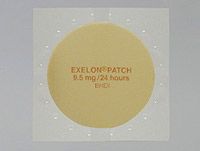Treatment for Early Stage Alzheimer’s: What is the Patch?
Learn about the Excelon Alzheimer's patch, a treatment option for early stage Alzheimer's that contains the cholinesterase inhibitor rivastigmine. The patch is convenient and has fewer side effects than the oral form of rivastigmine.

When discussing early-stage Alzheimer's treatment, one innovation that frequently garners attention is the Alzheimer's Patch. Several years ago, the FDA granted approval for the Excelon Alzheimer's Patch to address dementia symptoms associated with both Alzheimer's and Parkinson's diseases. This groundbreaking patch contains rivastigmine, a cholinergic agent also available in capsule form under the trade name Excelon. However, researchers have identified that many of the side effects associated with oral rivastigmine can be mitigated when administered via the patch.
Understanding Rivastigmine
Rivastigmine, introduced in 1997, is classified as a cholinesterase inhibitor that effectively alleviates mild to moderate dementia symptoms by preventing the breakdown of acetylcholine, an essential chemical in the brains of Alzheimer's and Parkinson's patients.
Acetylcholine is a neurotransmitter responsible for regulating motor functions, cognitive processes, and blood pressure. It is housed within cholinergic neurons found in the spinal cord and various regions of the brain. When released by a brain cell, acetylcholine swiftly binds to neurons equipped with receptors specifically designed for its transmission. Any hindrance in the release or binding of acetylcholine disrupts normal brain function.
In Alzheimer's dementia, where plaques and tangles infiltrate the brain, cholinergic neurons are damaged, inhibiting acetylcholine release. Patients with Alzheimer's experience neuronal death, particularly in critical areas like the amygdala, cortex, and the basal forebrain's nucleus basalis of Meynert. This reduced acetylcholine availability leads to impaired motor function and cognitive abilities in dementia patients.

The Alzheimer's Patch in Detail
This innovative Alzheimer's treatment takes the form of a small transdermal patch, applied once daily at the patient's convenience. It comprises four layers:
- The innermost layer (Layer 4) is the release liner, which must be removed before patch application.
- Layer 3 is an adhesive.
- Layer 2 contains the medication.
- Layer 1 serves as a colored backing, holding the patch together.
Over a 24-hour period, the Excelon patch consistently delivers a safe dose of rivastigmine into the patient's bloodstream. The effectiveness and dosage of the medication may vary depending on the patch's placement. Research indicates that attaching the patch to the chest, upper arm, or upper back yields better results.
While the Alzheimer's patch doesn't provide a cure for Alzheimer's, it has the potential to significantly slow the disease's progression, especially when used during the mild to moderate stages of Alzheimer's or Parkinson's disease.
Side Effects of Rivastigmine
Unlike oral rivastigmine, which often leads to nausea and vomiting due to its potent cholinesterase inhibitory action, users of the Excelon patch experience significantly lower rates of these side effects. Any side effects associated with the patch are typically mild and tend to subside over time, such as occasional itching or redness at the application site.
Rivastigmine is excreted through urine, bypassing the gastrointestinal tract and hepatic system, which reduces the potential for negative interactions with other medications used in early-stage Alzheimer's treatment.
Indications that the Alzheimer's Patch is Effective
The effectiveness of the Alzheimer's Patch can be observed through various signs:
- Improved ability to recognize, recall, and communicate.
- Enhanced speed in completing tasks requiring concentration when compared to placebo users.
- Stability in symptoms instead of worsening, as Alzheimer's is a progressively degenerative condition.
- Caregivers may notice sharper thinking, reduced depression or anxiety, and increased motivation in individuals responding well to the patch.
- Notable improvements might become apparent after eight to nine weeks of consistent use.

More on Early-Stage Alzheimer's Treatment: Comparing Treatment Options
For addressing mild to moderate dementia, the Excelon patch stands as one of the most effective treatment choices available. Many patients find it more convenient than oral capsules, particularly the elderly who may struggle with swallowing medications. Additionally, another FDA-approved drug, donepezil (trade name Aricept), is available for patients in all stages of Alzheimer's dementia, often prescribed for individuals with advanced symptoms.
You might also like this article:







